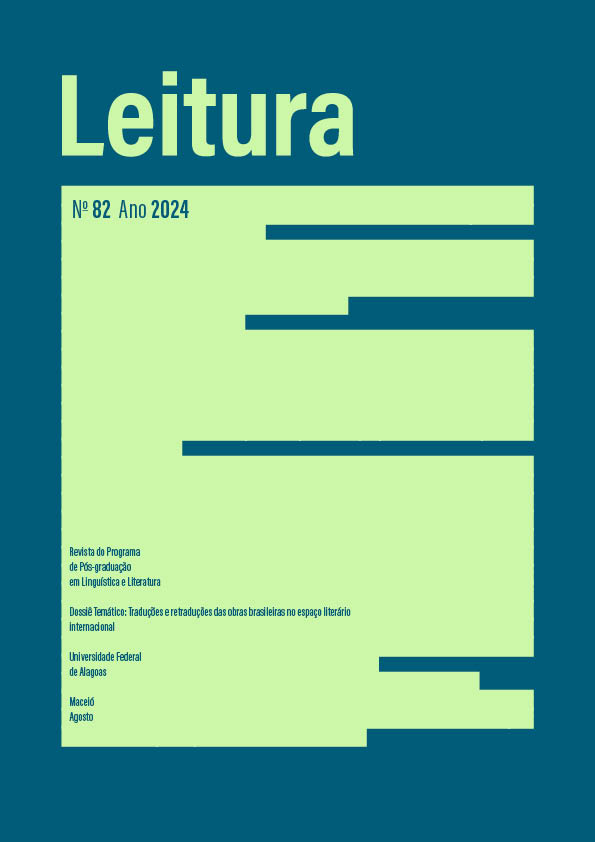Paco e Tonho auf Deutsch: tradução e realização cênica de Dois perdidos numa noite suja, de Plínio Marcos, na Alemanha
DOI:
https://doi.org/10.28998/2317-9945.202482.120-135Keywords:
Plínio Marcos, Tradução, DramaturgiaAbstract
This article investigates the relations between the German translation of Plínio Marcos’ Two Lost in the Filthy Night and the first two stagings of the Brazilian play in Germany, shortly before the country’s Reunification: one in April 1988, in the German Democratic Republic; and the other in May 1990, in the Federal Republic of Germany. Both were based on the same translation by Henry Thorau, published in 1985, and received negative reviews in the newspapers of the time. By comparing the original and the new text from the perspective of Antoine Berman’s “systematics of deformation” and analysing the available critical apparatus, we examine how the interlingual process (Portuguese-German) is the starting point of the intersemiotic negotiation (text-performance) and what intermediary interpretation the theatre team had access to during the staging process. In this way, we discuss the translation tools and strategies that reconfigured, in another cultural environment, a language full of slang, idiosyncratic expressions and curses which carry within them a lot of the ethical-moral dilemmas of the characters and the very Brazilian universe in which they are inserted. We argue that some simplifications in the treatment of the dialogues have made the dramaturgy less complex and therefore less productive on stage.
Downloads
References
AALTONEN, Sirkku. Time-Sharing on Stage: Drama Translation in Theatre and Society. Clevedon: Multilingual Matters, 2000.
ANDERMAN, Gunilla. Europe on Stage: Translation and Theatre. London: Oberon Books, 2006.
ANDERSON, Daniel. LinkedIn: Daniel Anderson. Berlim, out. 2011. Disponível em: https://www.linkedin.com/in/daniel-anderson-04b95240/. Acesso em: 11 nov. 2023.
ANDRADE, Wellington. O teatro da marginalidade e da contracultura. In: FARIA, José Roberto (dir.). História do teatro brasileiro, volume 2: do modernismo às tendências contemporâneas. São Paulo: Perspectiva: Edições Sesc-SP, 2013.
BERMAN, Antoine. A tradução e a letra ou o albergue do longínquo. Tradução: Marie-Hélène C. Torres, Mauri Furlan, Andreia Guerini. 2. ed. Tubarão: Copiart; Florianópolis: PGET/UFSC, 2013.
BIGLIAZZI, Silvia; KOFLER, Peter; AMBROSI, Paola (eds.). Theatre Translation in Performance. London; New York: Routledge, 2013.
BRANDÃO, Tânia. Artes cênicas: por uma metodologia da pesquisa histórica. In: CARREIRA, André et al. (org.). Metodologias de pesquisa em artes cênicas. Rio de Janeiro: 7Letras, 2006. (Memória Abrace, v. 9.)
HERBERT Neubecker. D:kult, Düsseldorf. Personen. Disponível em: https://emuseum.duesseldorf.de/people/61218/herbert-neubecker. Acesso em: 11 nov. 2023.
KLOSE, Gisela. Schuh oder Leben. Taz, Berlin, n. 3108, 16 maio 1990. Inland, p. 16. Disponível em: https://taz.de/Schuh-oder-Leben/!1768068/. Acesso em: 11 nov. 2023.
LIVROS. Plínio Marcos: Sítio Oficial. Disponível em: https://www.pliniomarcos.com/livros.htm. Acesso em: 11 nov. 2023.
LOPES, Angela Leite. Escrita e tradução. Urdimento, Florianópolis, v. 2, n. 35, p. 206-223, ago./set. 2019.
MAGALDI, Sábato. Panorama do teatro brasileiro. 6. ed. São Paulo: Global, 2004.
MARCOS, Plínio. Melhor teatro. Direção: Sábato Magaldi; seleção: Ilka Marinho Zanotto. São Paulo: Global, 2012. 1 e-book Kindle.
MARCOS, Plínio. Zwei Verlorene in einer schmutzigen Nacht. Tradução: Henry Thorau. Berlin: henschel SCHAUSPIEL, 2010.
MENDES, Oswaldo. Bendito maldito: uma biografia de Plínio Marcos. São Paulo: Leya, 2009. 1 e-book Kindle.
MORAVIA, Alberto. Roman Tales. New York: Signet Books, 1959.
MORINI, Massimiliano. Theatre Translation: Theory and Practice. London: Bloomsbury, 2022.
PREMIERE. Gallus Theater, Frankfurt, 2002. Disponível em: http://www.gallustheater.de/2002/01/verlore.php. Acesso em: 13 jan. 2024.
THORAU, Henry. Rezeption mit Rezept: Wie brasilianisches Theater deutsches Theater animiert. In: BADER, Wolfgang (Hrsg.). Deutsch-brasilianische Kulturbeziehungen —Bestandsaufnahme, Herausforderungen, Perspektiven. Frankfurt am Main: Vervuert, 2010.
THEATERGESCHICHTE. neue Bühne Senftenberg, Senftenberg, [2022?]. Disponível em: https://www.theater-senftenberg.de/theatergeschichte. Acesso em: 11 nov. 2023.
SCHAUSPIEL Köln. cuturall.info, Dresden. Disponível em: https://www.koelner-kultur.de/kultur/koeln/auffuehrung/schauspiel.koeln/termine.html. Acesso em: 11 nov. 2023.
SCHMIDT, Thomas. Elemente des deutschen Theatersystems: Praxis Kulturmanagement. Wiesbaden: Springer VS, 2018.
SCHWARCZ, Lilia Moritz. Nem preto nem branco muito pelo contrário: cor e raça na sociabilidade brasileira. São Paulo: claro enigma, 2013.
SCOLNICOVA, Hanna; HOLLAND, Peter (ed.). The Play Out of Context: Transferring Plays from Culture to Culture. Cambridge: Cambridge University Press, 1989.
SHAKED, Gershon. The Play: Gateway to Cultural Dialogue. In: SCOLNICOVA, Hanna; HOLLAND, Peter (ed.). The Play Out of Context: Transferring Plays from Culture to Culture. Cambridge: Cambridge University Press, 1989.
SPÖRL, Volkmar. Nur Kumpel?. Theater der Zeit, Berlin, n. 6, 1988. Umschau, p. 8-9.
UTA Kala. Kömodie am Kurfürstendamm, Berlin. Disponível em: https://www.komoedie-berlin.de/personen/uta-kala.html. Acesso em: 11 nov. 2023.
VITA. Yüksel Yolcu, 2017. Disponível em: http://www.yueksel-yolcu.com/vita.html. Acesso em: 13 jan. 2024.
ZANOTTO, Ilka Marinho. Descida aos infernos. In: MARCOS, Plínio. Melhor teatro. Direção: Sábato Magaldi; seleção: Ilka Marinho Zanotto. São Paulo: Global, 2012. 1 e-book Kindle.
ZWEI Männer, ein Paar Schuhe. Taz, Berlin, 2 abr. 1994. Kultur, p. 35. Disponível em: https://taz.de/!1569280/. Acesso em: 13 jan. 2024.










